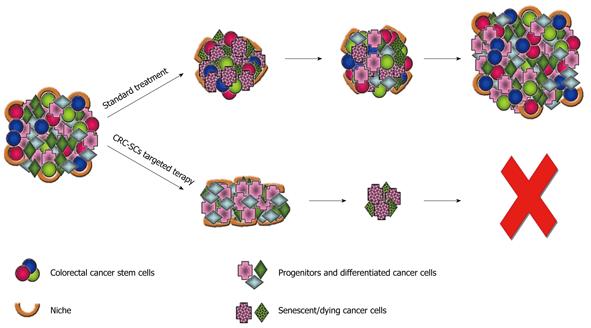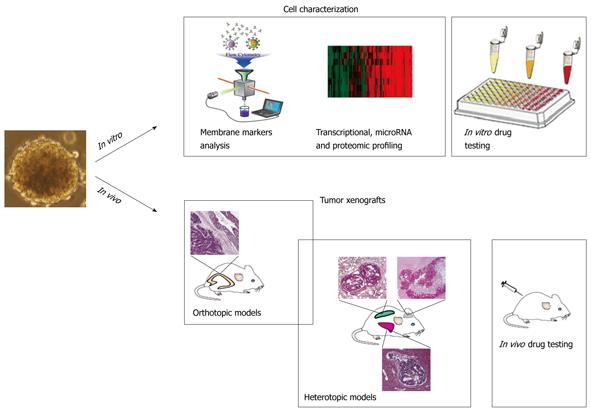©2010 Baishideng.
World J Gastroenterol. Aug 21, 2010; 16(31): 3871-3877
Published online Aug 21, 2010. doi: 10.3748/wjg.v16.i31.3871
Published online Aug 21, 2010. doi: 10.3748/wjg.v16.i31.3871
Figure 1 Therapeutic implication of cancer stem cells.
The failure of current standard therapies in tumor eradication can be explained by assuming that colorectal cancer stem cells (CRC-SCs) are able to survive treatments leading to an only transitory clinical remission. Therapeutic strategies that specifically target the CRC-SC pool, by eliminating the self-renewing component of the tumor mass, could be more effective in eradicating the tumor and reducing the risk of relapse and metastasis.
Figure 2 Colorectal cancer stem cells as a tool for drug discovery.
In vitro, colorectal cancer stem cells (CRC-SCs), isolated from the tumor specimen, are propagated as “tumor spheres”. Membrane marker analysis together with transcriptional, microRNA and proteomic profiling lead to the identification of molecular targets that are expressed by this cell population. These findings can be used to evaluate the cytotoxic ability of new compounds. In vivo, CRC-SCs can be orthotopically and heterotopically injected into immunocompromised mice generating tumors that mimic the cytoarchitecture of the parental tumors. The use of such mouse models of CRC allows for drug testing analyses in order to eradicate the primary tumor and avoid the formation of incurable metastases.
- Citation: Fabrizi E, Martino SD, Pelacchi F, Ricci-Vitiani L. Therapeutic implications of colon cancer stem cells. World J Gastroenterol 2010; 16(31): 3871-3877
- URL: https://www.wjgnet.com/1007-9327/full/v16/i31/3871.htm
- DOI: https://dx.doi.org/10.3748/wjg.v16.i31.3871














